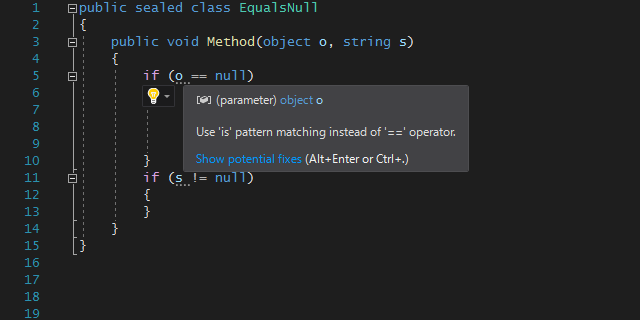EqualsNull

Summary
Use “… is null” or “… is {}” instead of
“… == null.”
Default severity
Info
Description
This rule reports diagnostic information of using the equality operators
(“==” and “!=”) with null as follows:
- The operator is either “
==” or “!=.” - The right operand is
null. - The type of the left operand is not a non-nullable value type.
(If it is a non-nullable value type, the compiler raises CS0472
and the expression is always
trueorfalse.)
Note that the default diagnostic severity of this analyzer is Information.
Code fix
The code fix provides an option replacing the expressions
“… == null” and “… != null” with
“… is null” and “!(… is null),” respectively.
Also, it provides another option replacing them with “!(… is {})”
and “… is {},” respectively.
Remarks
It can be a breaking change to replace the expression “… == null”
with “… is null,” as well as “… != null” with
“!(… is null),” and vice versa. For example, the expressions
“o is null” and “o == null” result in
the same IL code as long as its equality operators
are not overridden, as follows:
class C
{
bool IsNull(C o) => o is null;
/*
IL_0000: ldarg.1
IL_0001: ldnull
IL_0002: ceq
IL_0004: ret
*/
bool EqualsNull(C o) => o == null;
/*
IL_0000: ldarg.1
IL_0001: ldnull
IL_0002: ceq
IL_0004: ret
*/
}
However, when its equality operators are overridden, those expressions result in different IL codes, as follows:
class C
{
bool IsNull(C o) => o is null;
/*
IL_0000: ldarg.1
IL_0001: ldnull
IL_0002: ceq
IL_0004: ret
*/
bool EqualsNull(C o) => o == null;
/*
IL_0000: ldarg.1
IL_0001: ldnull
IL_0002: call bool C::op_Equality(class C, class C)
IL_0007: ret
*/
public static bool operator== (C o1, C o2)
=> object.ReferenceEquals(o1, o2);
public static bool operator!= (C o1, C o2)
=> !object.ReferenceEquals(o1, o2);
}
Note that the result of “o == null” may differ from the one of
“o is null” if the equality operators are strangely overridden
as follows:
class C
{
⋮
public static bool operator== (C o1, C o2) => true;
public static bool operator!= (C o1, C o2) => false;
}
Example
Diagnostic
public void Method(object? o, string? s)
{
if (o == null && s != null)
{
⋮
}
⋮
Code fix (with the constant pattern)
public void Method(object? o, string? s)
{
if (o is null && !(s is null))
{
⋮
}
⋮
Code fix (with the property pattern)
public void Method(object? o, string? s)
{
if (!(o is {}) && s is {})
{
⋮
}
⋮